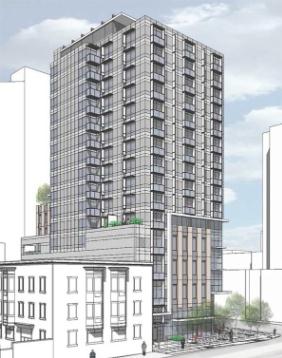Vancouver City Council approved a rezoning application for the Wall Financial Corporation May 15 that will provide a new home for Positive Living BC and AIDS Vancouver as well as 81 units of social housing.
The 15-storey structure, valued at $28.5 million, will be constructed on the site of Positive Living BC’s existing facility at 1107 Seymour St. The ground floor will be dedicated to lobby and retail space; the next four floors will be used as social service space for Positive Living BC and AIDS Vancouver. The remaining floors will be split between housing for people receiving social assistance and low-end market renters. Rent will be geared to income levels based on need.
“This means we’ll have a permanent home, and it means a facility that is brighter, more modern,” says John Bishop, chair of Positive Living BC.
“Our building is quite old, and it can be a very dark space,” he says. “Having it refurbished, rebuilt and purpose-built means it will be much easier to work with a brighter place. It’ll be a more inviting place.”
The development is part of the Wall Financial Corporation’s community amenity contribution for a new 43-storey high-rise at 1300-1320 Richards St, which was also approved at the same meeting. The Wall Financial Corporation will contribute $23,643,750 to the development of the subsidized Seymour Street property, and the remaining $4,900,660 will be paid from the City of Vancouver’s Development Cost Levies.
Bishop expects construction of the Seymour Street development to begin sometime next year and take anywhere from 18 to 36 months, which means that Positive Living and AIDS Vancouver will seek temporary accommodation close to their current location.
“I was so wound up after the meeting I didn’t sleep last night,” Bishop says. “It’s absolutely a milestone for us. It means that our future is so much more secure. The building is going to be turned over to the city, so we will be tenants of the city in this building. The 11 floors of social housing will be operated by the city to an independent contractor – not us. But we are hoping that some units will be set aside for HIV-positive seniors.”
While all councillors voted in favour of the amenity, Green Councillor Adriane Carr voted against the primary Richards Street development responsible for the amenity, saying that “egregiously tall towers” are not the way to get a green city.
“They were two separate issues, and the reason why I didn’t vote for the first is that it really is too tall and it exceeds the zoning,” she says, adding that some community members are against it. “They will also put up an egregious wall of concrete that the people across the alley will have to face.”
Carr was very supportive of the amenity, however.
“AIDS Vancouver, Positive Living BC, A Loving Spoonful, all of the services they provide perform a phenomenal public service,” she said at the meeting. “I think this is a very exciting project, and I’m very happy to support it.”
Vision Councillor Tim Stevenson feels that Carr was insincere with her vote. Had all the councillors voted against the Richards Street development, they wouldn’t have gotten a new building for Positive Living or AIDS Vancouver, he points out.
“I simply do not understand how Councillor Carr can vote in favour of this [the amenity] when she voted against the last project,” Stevenson said at the meeting. “The last project pays for this project. I don’t know where the money would have come from. There isn’t that kind of money just sitting around in a big pot of gold to pay for this project. So to say, ‘I’m in favour and I love Positive Living and this is all just wonderful to me’ is nonsense because you would never have this built unless this project is going ahead.”
Carr contends that the project would have gone ahead if the Richards Street development was only 30 storeys.
“I asked staff if the developer would have to pay community amenity contributions if they developed to 30 storeys from the seven storeys that were allowable under our bylaw,” she says. “The community had felt they could potentially live with 30 storeys that was maybe allowed, but they boosted it 13 more storeys. I reasoned if they held up to 30 storeys they would still have paid community amenity contributions that could have funded the other development. There would not have been a loss of revenue.”
Stevenson notes that Carr did not propose any amendments to reduce the height of the Richards Street development to 30 storeys.
“She’s just running for cover, looking for any excuse she can, because she suddenly realized she’s been caught with her pants down,” he charges. “She didn’t try to make an amendment to 30 storeys. Why didn’t she make an amendment? All she had to say was I’m in favour of this, but I cannot support something over 30 storeys. Nowhere does she say anything like that.”
AIDS Vancouver executive director Brian Chittock says that while Carr has always been supportive of his organization, her rationale on this vote doesn’t make sense.
“She was talking about zoning being the guidelines for the city and how communities develop,” he says. “The Richards Street development was a rezoning development request as was ours, and she voted against one but not the other, and that building is paying for us, so it’s a contradiction.”
A representative of the Wall Financial Corporation could not be reached for comment before press time.

 Why you can trust Xtra
Why you can trust Xtra


